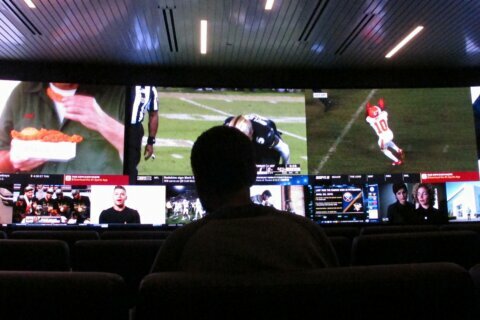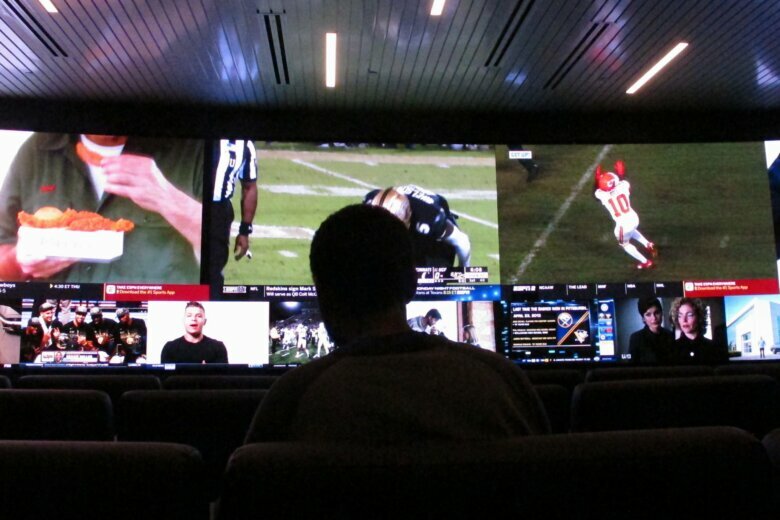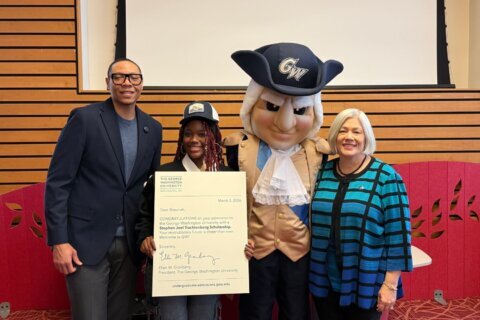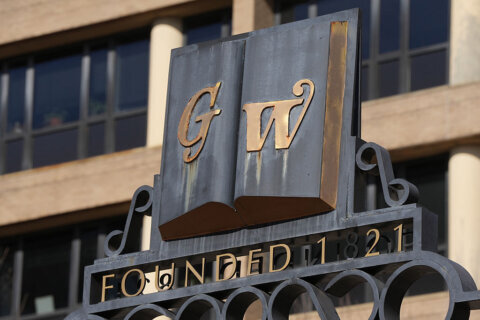
A tax revenue windfall from legalized sports betting has yet to become reality in D.C.
The D.C. Council first voted to legalize sports betting in 2018, with promises of tens of millions of dollars in new tax revenue.
Every year since, those revenue projections have been revised down as legal battles, startup costs, the coronavirus pandemic and other hiccups caused sports betting in the District to resemble a lawn mower that won’t start.
The potential for a loud and mighty roar was there, but it struggled to get going.
Pressure might be building on the District to make changes, as revenues soar in Virginia and sports betting is about to arrive in Maryland.
At a DC Council Committee on Business and Economic Development budget oversight hearing Thursday, lottery officials confirmed that through the first three quarters of the fiscal year, D.C. had “right around $230,000 in revenues,” said Craig Lindsey, the interim Chief Operating Officer of the D.C. Lottery.
The most recent projections the city was working with was for sports betting to bring in more than $6 million. The next fiscal year’s projections expect the city to triple that number.
It led to about 45 minutes of questions and answers that left councilman Kenyan McDuffie, the committee chair, sometimes bewildered — and less than confident in the answers he heard.
“This fiscal year has been difficult for us because of the COVID restrictions and we’re looking forward to next fiscal year being able to significantly increase that, once we get retail-based sports wagering operational,” said Ridgely Bennett, the D.C. Lottery’s general counsel.
During the exchange, he repeatedly argued that D.C.’s GambetDC app would see an increase in use as more tourists started coming back and more commuters returned to offices in the city, including from places like Virginia, which already has mobile betting.
“Just like the rest of the entertainment industry in the District, we’re cautiously, cautiously optimistic,” said Bennett.
“Once we open retail sports wagering, you’ll be able to go to a location and pay with cash,” said Bennett, who argued that the verification process required to set up online mobile accounts — which includes bank information and Social Security numbers — was too onerous.
“Many people prefer to pay with cash,” Bennett said, an argument that may have proved true in D.C. over the past few months, but is thoroughly contradicted everywhere else in the country where sports betting is legal, including Las Vegas and New Jersey — where such verification requirements haven’t hindered anything.
Just in April, Virginia’s competitive mobile betting market generated over $1 million dollars in new tax revenue that went into the state’s general fund.
Bennett said that more people were willing to stand in line at William Hill’s betting windows at Capital One Arena, or use its app within two blocks of there, because William Hill is an established brand — and GambetDC is not.
He said that the city was working to adjust the odds and payouts, which the gaming industry has long stated was behind the lack of interest in GambetDC’s product.
McDuffie speculated that the city would earn more tax revenue if it opened itself up to more mobile competition.
In fact, the limited competition already happening in D.C. — in the form of William Hill — is doing just that.
“I know their tax revenue was $1.044 million,” said Bennett.
So far this fiscal year, about $92 million has been wagered through William Hill, which requires customers to either show up to Capital One Arena with cash or to venture within two blocks of the arena to use its mobile app.
In recent weeks, BetMGM users have also been able to do the same in the area of Nationals Park.
On the other hand, GambetDC users wagered only about a third of that, despite being the only app available for use in the city outside of the two block exclusion zone areas of those two sporting venues.
That means while you have to use William Hill or BetMGM if you’re within two blocks of their affiliated sports venues, you can only use GambetDC anywhere else in the city.
That William Hill saw more than $60 million more wagered there versus on GambetDC prompted nearly 30 seconds of silence from McDuffie as he processed the current situation.
But Bennett was resolute, arguing that the city’s built-in advantages would pay off beginning later this calendar year.
“What we believe will happen now that the city is opening up, now that sporting events are actually occurring, you’ll see how that model will bring in a significantly greater revenue to the District than what the privately operated sports wagering will do,” said Bennett.
“We’ll have to see, but that’s how the program is designed and we’re still confident in the model,” he added.
“I am admittedly less confident than you are,” responded McDuffie. “As I continue to delve deep into this … I’ve got to tell you my confidence isn’t growing. It isn’t improving.”









